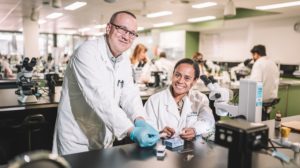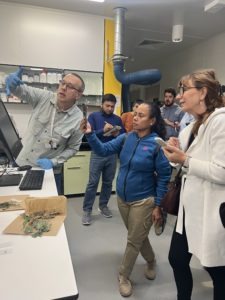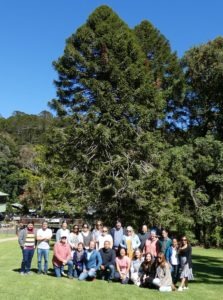

Powdery Mildew Crop Pathogen Training
July 11, 2023
The Crawford Fund QLD Committee supports targeted training and mentoring of overseas scientists and extension officers by experienced Queensland counterparts working on similar agricultural research challenges through its International Engagement Awards.
Support was recently provided for Mrs Luisa De Fatima Soares Moniz from the Department of Agriculture in Timor Leste to attend the Powdery Mildew Capability Building Workshop at University of Southern Queensland (UniSQ), where she was also mentored by Prof Levente Kiss, the workshop’s convenor.

Luisa (seated) and her mentor, Prof Levente Kiss, during the lab practical of the Powdery Mildew Workshop at UniSQ.
Powdery mildews are a common and economically important group of plant pathogens of many crops in both Timor Leste and Australia. Luisa had been chosen as she has been working with the Northern Australia Quarantine Strategy (NAQS) of the Commonwealth Department of Agriculture, Fisheries and Forestry (DAFF).
“Offering Luisa this training opportunity is beneficial for both Australia, and the agricultural sector in Timor Leste,” said Levente.
The five-day workshop, funded by DAFF, focused on the precise identification of the powdery mildews.
“The workshop was a good networking opportunity for Luisa too as it was attended by 27 plant biosecurity diagnosticians from across Australia,” he said.
Following the workshop, Luisa received one-on-one training at UniSQ with Prof Kiss and the Queensland Department of Agriculture and Fisheries in Brisbane and Mareeba. She has also visited the NAQS laboratory in Cairns.
Northern Queensland is vulnerable to exotic pest, weed and disease arrivals especially from countries that face our continent from north. From a plant biosecurity perspective, it is important to be as informed as possible of the fungal and other plant pathogens that are present in the neighbouring countries, but not in Australia, and may represent a biosecurity risk to our country. This is often challenging because it is difficult to get access to certain areas in the neighbouring countries, including Timor Leste.
“Training plant biosecurity diagnosticians in the neighbouring countries is vital for crop biosecurity and supports northern Queensland and national biosecurity efforts,” said Levente.
“During her visit, Luisa gained confidence in the morphological and molecular identification of powdery mildews at the species level. Her laboratory work resulted in the identification of some species that have not been reported from Timor Leste and/or Australia so far,” he said.
These results should be published by Luisa in collaboration with colleagues from UniSQ and DAFF in an international research journal, such as Australasian Plant Pathology.


Left: Prof Kiss explains a microscopy technique during the Powdery Mildew Workshop at UniSQ and Luisa records the explanations. Right: Group photo of the Powdery Mildew Workshop participants in the Bunya Mountains.




 0
0